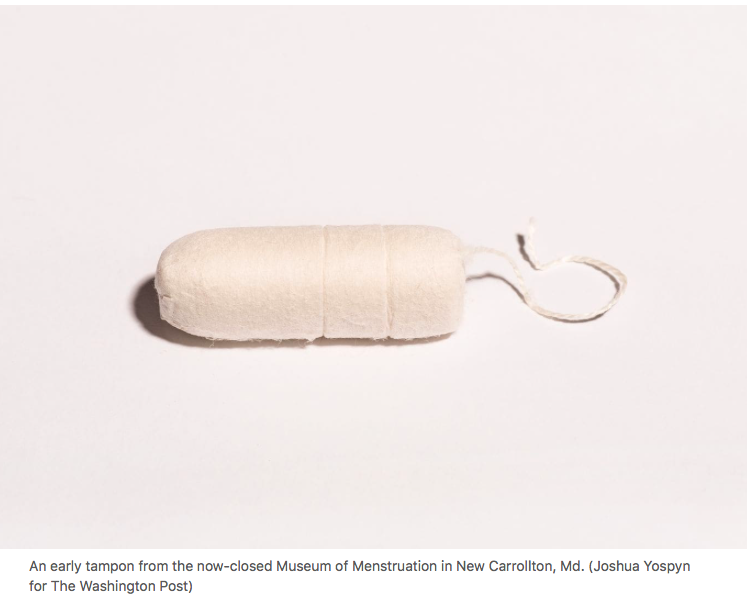Activists call on Education Secretary DeVos to take action for ‘menstrual equity’ in schools
By Valerie Strauss, published in The Washington Post on January 28, 2019
“Menstrual equity” activists are calling on Education Secretary Betsy DeVos to take action to ensure that K-12 school bathrooms are equipped with free menstrual hygiene products to combat what they call “period poverty.” They are expected to march Monday near the Education Department headquarters, and they took out a full-page ad directed at DeVos.
The ad, on the back page of The Washington Post’s Monday A-section, features a letter sent to DeVos that says in part:
“In 21st century America, schools have an obligation to serve all students equitably. Every student deserves the reassurance that their school restrooms are outfitted with necessities to accommodate their biological needs. Yet, for over half the US student population, there is a glaring exception to this commitment: menstrual hygiene products. . . . We call on you, Secretary DeVos, to fulfill your agency’s charge to remove discriminatory barriers that hold students back. Menstrual hygiene products are basic necessities, and the inability to access them affects a student’s freedom to study, be healthy, and participate in society with dignity.”
The Education Department did not immediately respond to queries about the ad or the issue. Activists planned to hear Monday afternoon from speakers calling on DeVos to act on the issue.
The ad was spearheaded by United for Access — a national grass-roots campaign associated with Thinx, a period solutions company — and by Period, the world’s largest youth-run nonprofit dedicated to changing the conversation around periods and providing care to those in need. Period was founded in 2014 by two high school students, Nadya Okamoto and Vincent Forand, and has a few hundred chapters across the country.
The letter printed in the Post ad was signed by about two dozen women, including entertainers Margaret Cho, Padma Lakshmi, Busy Philipps and Cynthia Nixon, as well as the leaders of the two major teachers unions: National Education Association President Lily Eskelsen García and American Federation of Teachers President Randi Weingarten.
It calls on DeVos and her department to “address inequity among students by championing menstrual equity.”
This includes acknowledging period products as health necessities, advocating for policies that support students who menstruate, funding programs to provide free period products to students in all school restrooms, promoting comprehensive period health education for students of all genders before the age of 12, and commissioning a study to determine the impact period poverty has on students in the United States.
Students and activists around the country have been pressing for years for school bathrooms to be supplied with menstrual products in what has become a national movement for “menstrual equity.” Its aim is to provide access to menstrual products to anyone who needs them, especially those from low-income families.
A 2018 poll sponsored by Always, a company that produces menstrual supplies, found that nearly 1 in 5 girls in the United States have left school early or stayed home because they did not have period products. The menstrual equity campaign aims to help not only female but also transgender and non-binary students.
Activists are pushing state legislatures to make menstrual products tax-free, given that more than 35 states still tax them. (Last year the government of India scrapped a hefty tax on sanitary napkins.) In the Washington region, Maryland has exempted menstrual products from state taxes since 1980, and late last year D.C. Mayor Muriel E. Bowser (D) announced the nation’s capital would do the same.
Efforts in the Virginia legislature to drop taxes on menstrual products have been unsuccessful, although “menstrual cramp relievers” are exempt from state taxes,according to a list of tax-free products, as are laxative preparations, wart removers and oil of wintergreen.
Last year at Justice High School in Northern Virginia, the chapter of Girl Up, an international club devoted to gender equality, began a campaign to outfit restrooms with menstrual products. A Washington Post story about the effort quoted Jen Golobic, an English teacher at Justice, as saying that students may have avoided asking for sanitary pads from the school clinic because they felt uncomfortable doing so.
“It should just be part of our culture,” said Golobic, who sponsors the Girl Up club. “Girls shouldn’t have to be embarrassed about something that’s just a natural, biological need.” [Her school’s restrooms didn’t have pads or tampons. So she took matters into her own hands.]
The cover story of the spring 2019 edition of Teaching Tolerance magazine offers a look at the menstrual equity movement, noting that the issue goes beyond products in school bathrooms and tax policy.
Educators can remove the stigma surrounding menstruation not only by providing access to free menstrual products in schools . . . but also by challenging inequitable school policies. These include dress codes that require khaki bottoms, rather than darker pants or skirts, that make it obvious when a person is bleeding. Educators can also normalize the subject through health education, according to the magazine.
A United for Access petition has at least 35,000 signatures at the Thinx website.
The issue is not confined to the United States; menstrual equity has been a cause in Britain, too, where activists have pushed some schools into providing free menstrual products. A poll published in 2018 in British newspapers, sponsored by a sanitary pad company, found that 7 percent of girls in Britain missed school during the previous year because they couldn’t afford sanitary products.





